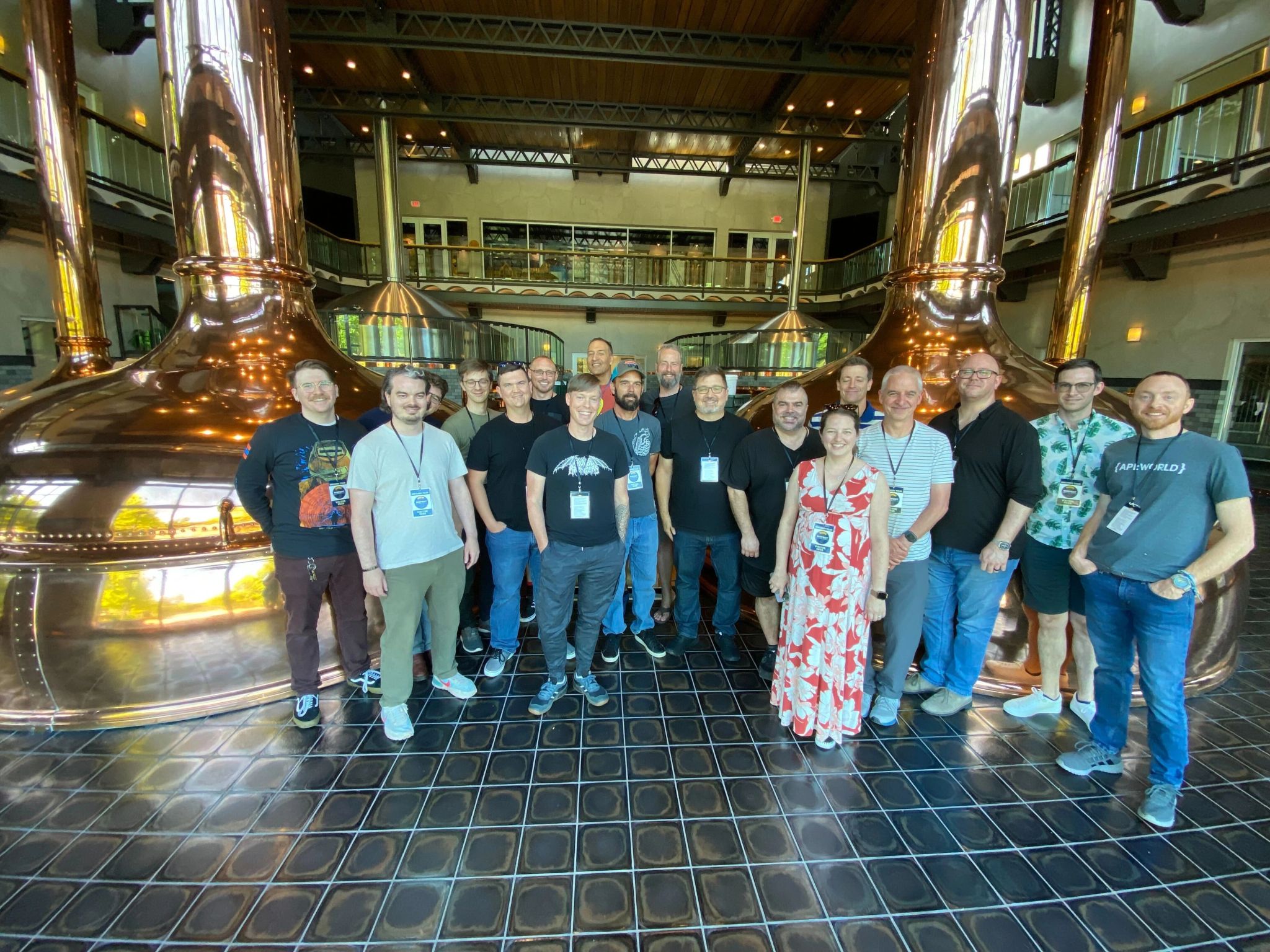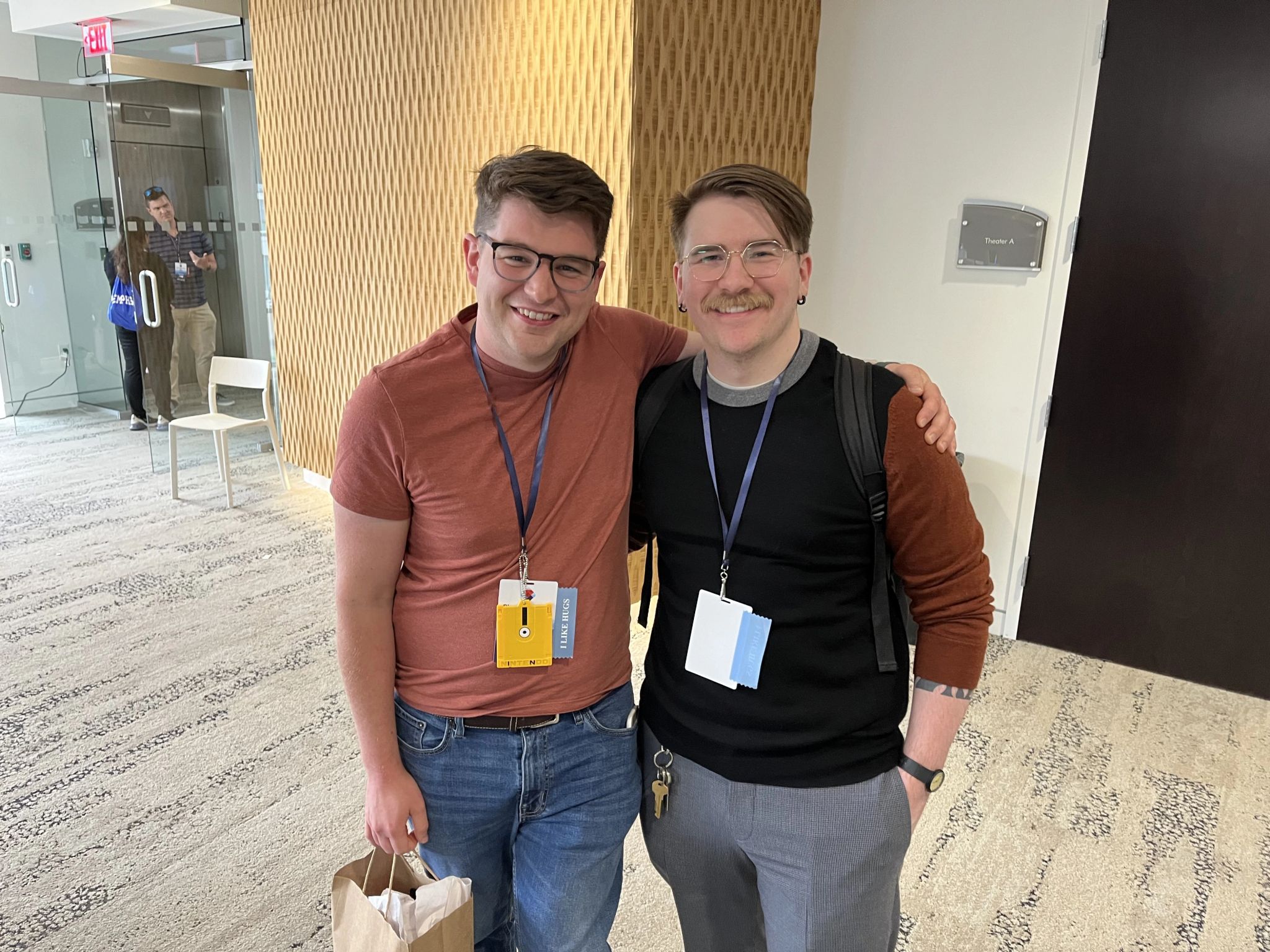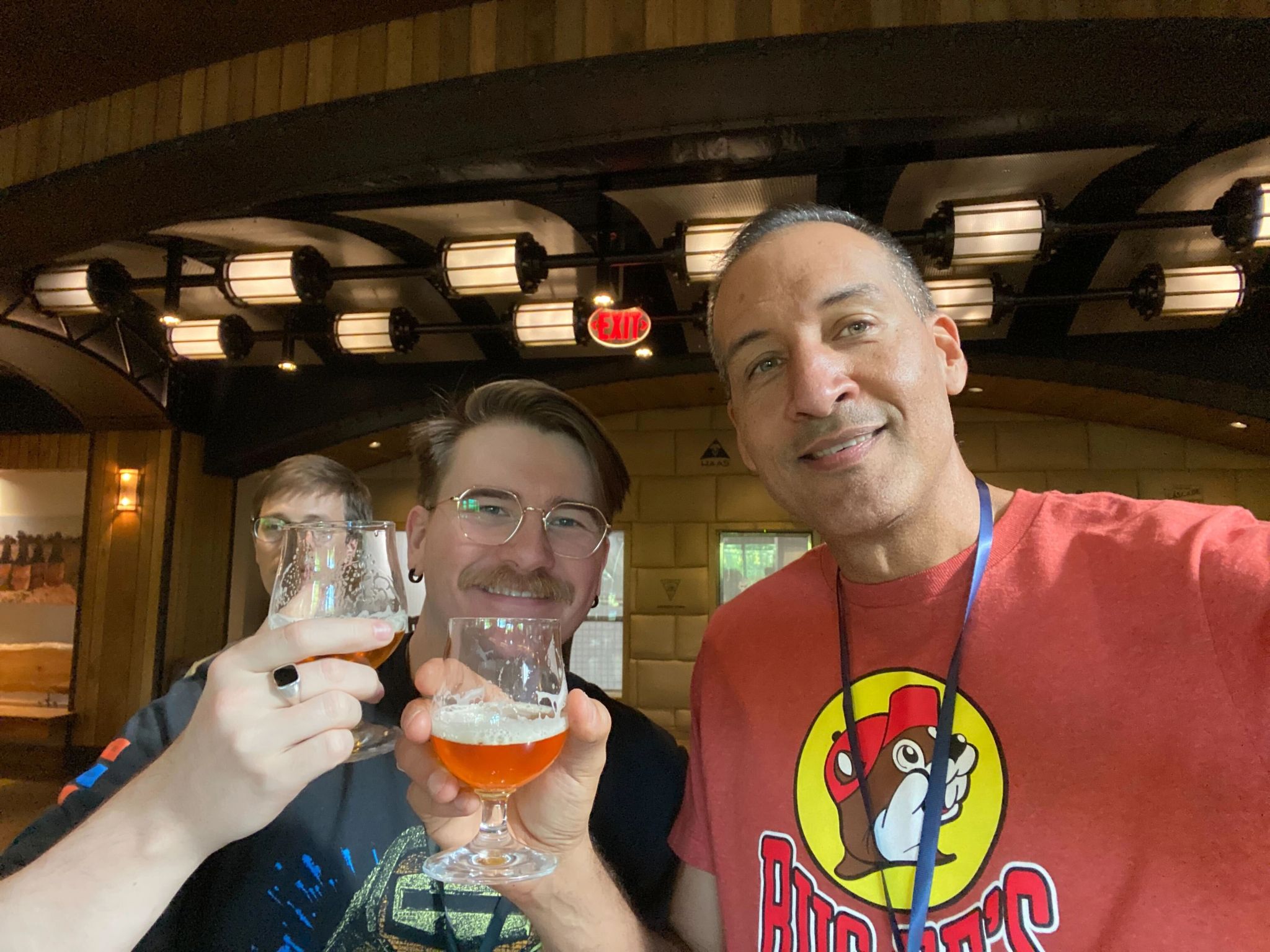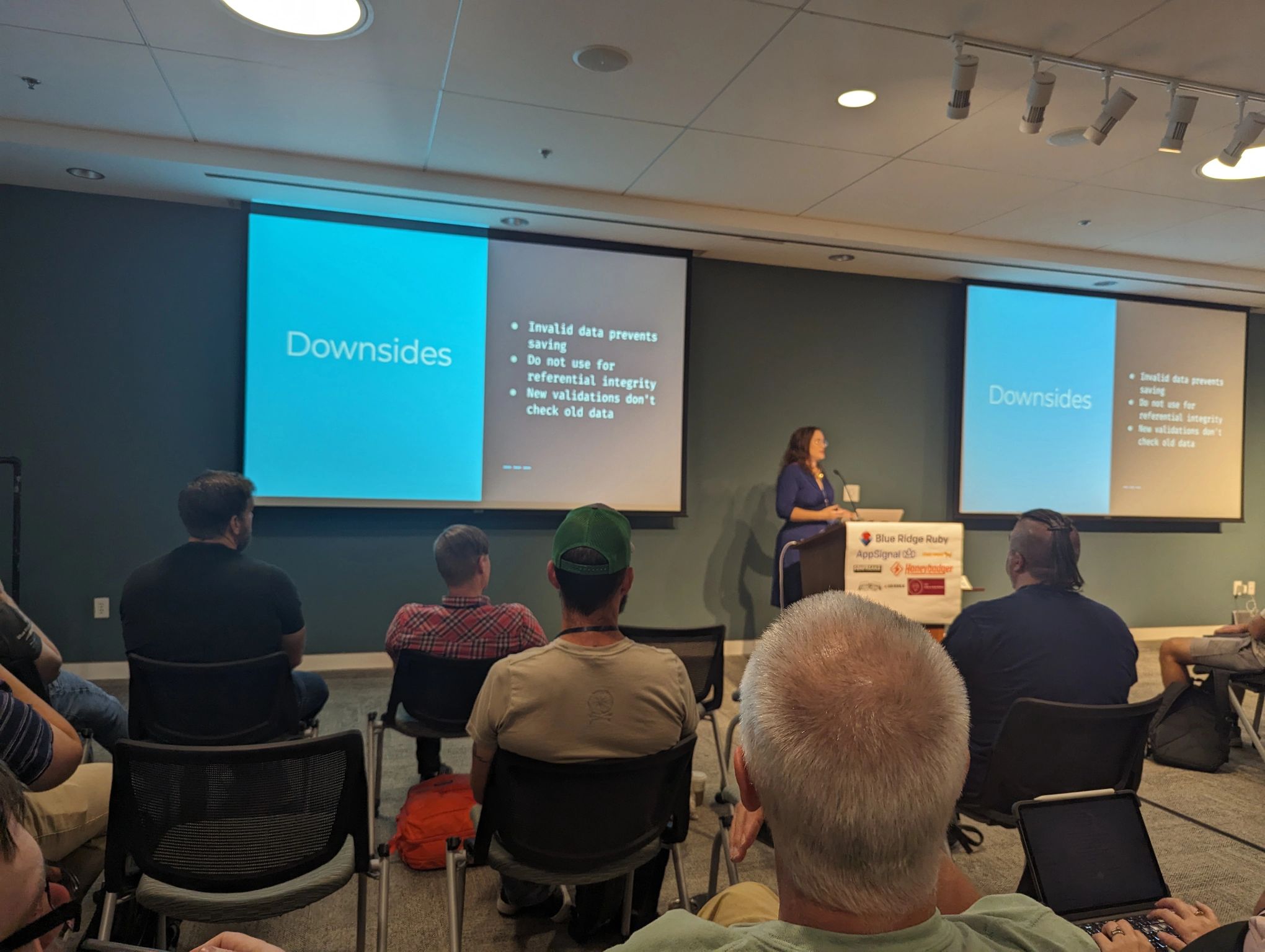This past week, attending Blue Ridge Ruby in Asheville, North Carolina, profoundly changed my self-perspective and reignited a motivation I thought unattainable. This shift in perception came not just from the speakers but from personal conversations with wonderfully insightful individuals. However, I feel it’s important to share some vulnerability before expanding on that shift.
As a senior majoring in Information Systems & Technology at Temple University, I’ve been balancing full-time work and school for the past three years, like many of my peers. My job is demanding, consuming about 200 hours a month, with only a fraction of that time paid. This leaves me with limited mental capacity for learning, academic work, or portfolio projects. It can be like trying to climb a mountain with weights on one’s ankles, so coming into this conference, my spirits and my overall self-confidence had felt really low. However, I knew that this event, being my first, was important and I was going to be able to attend with my friend and mentor, Thomas Cannon. Regardless of how I had been feeling, I was still excited to be going.
Now for the event itself, many attendees have written in-depth accounts of the event, offering insights I can hardly match. See Josh Wood’s article here, as well as Thomas Cannon’s blog here. We started off with really strong anecdotal experiences from “real” programmers (I say “real” in quotations because how one defines “real” is different. I say “real” and I mean paid, employed, successful, respected. Others say “real” and somehow have included me in that definition, however I still feel I have a long way to go.) who provided insight to navigating a week in the life of a professional, finding and addressing database related bugs in a large system serving thousands, to hundreds of thousands, or millions of potential clients, like Danial Colson’s talk. There were people who aren’t programmers who spoke beautifully on why the words we use within this space matter and how writing can not only advance our work as a community but also advance our own individual understanding, such as Travis Turner’s talk. All of the speakers at this event brought their own unique perspectives to the table, and I am grateful for all of them sharing so openly about them. Like I said, however, this isn’t a recounting of the event itself but the unique social experiences that came with it.
For one, despite the high level of senior development experience, the event felt surprisingly accessible. Someone such as myself, in their senior year of college, with limited experience in the far and wide technical work spaces of the world, would normally not find the talks relatable, or even understandable, considering what other senior development tech conferences tend to feel like. We’ve all had the experience as junior technical enthusiasts (or as Brian Childress referred to us, Technologists) where a senior dev, of vastly greater experience, speaks to us at a level that doesn’t seem to reflect that of our own knowledge. Students may especially relate to the feeling of someone bombarding us with weighted phrases like “shipping product” knowing full well most of us have never shipped a product in academia, but we just sheepishly nod and hope they don’t ask pressing questions about our own knowledge. This was not at all the experience at Blue Ridge Ruby. I was asked plenty of questions, and at no point in time was I made to feel less than by acknowledging my status as a student, with limited coding experience. If anything it was met with genuine excitement. “Oh, we have a junior developer? This is awesome! We need more junior developers! Welcome!”. When I tell you the joy I felt to be welcomed at my current level was so overwhelming because I genuinely never thought I was going to experience that in my journey through tech. Being accepted at my current level, with my current status, was validating to say the least. I particularly remember a conversation with Murat Yorukoglu, who spent a long time acknowledging many of my worries with shifting careers later in my life, and how difficult the market can be in these times. I was so excited to walk away with that connection in place, he acknowledged at the time that it was unusual for there to be such a strong sense of community in convention settings like this one.
Speaking of connections, I have never met so many people who were open to connecting. I found that I wasn’t the only person looking for more opportunities. I was surrounded by others who had shifted or were shifting their careers to align with their goals. Lauren Auchter gave a profound presentation about shifting careers and relieving associated guilt. She then took a fifteen-minute walk with me, listening to my grievances about seeking new work and returning to school. She spent that time nodding, affirming, and encouraging me. JP Ashenfelter also sat with me, discussing travel, food, and offering an in-depth breakdown of what to do in New Orleans. During breaks in our conversations, I received affirmations about my future and encouragement to continue growing. There are too many people to thank individually for their time and energy invested in me over this three-day conference, which apparently isn’t common at most tech conventions.
So here I am, affirmed, encouraged, and surrounded by successful people who have way more experience to learn from than I know what to do with. I needed to lock in on some key takeaways, otherwise I’m just feeling good without anywhere to go with it. One, communication is a wonderful soft skill that is required in this field, as well as community. Every person at this event could attribute and recall the amazing work done by another within the community. Two, mindfulness in the face of isolation and work from home is imperative. It’s too easy to fall into the same motions and ruts when you have limited external feedback. Three, write everything down. Speaking with people like Raf Floresta and Jeremy Smith, I realized that I was not giving myself the best advantages possible in my learning process. Many of the issues I was running into with my degree program and my own growth was that I wasn’t leaving myself a flag to come back to. So if I were to take a week break, or more likely spend the weekend working, by the time I made it back to what I was previously working on I had completely forgotten where I had left off and what I was originally struggling with. Fourth and final was that it’s important to ask questions. Even the ones that make us feel dumb. I had to ask people to retrace their steps and explain aspects of their technical explanations to me plenty of time, but in doing so helped them realize where their dialogue may not be as accessible as they thought it was. Asking questions and engaging with a community is arguably one of the only ways any of us have a fighting chance in our careers and personal life, but having a wonderful community around you is really beneficial as well.
Reflecting on my time at Blue Ridge Ruby, I realize how profoundly this experience has impacted me. The acceptance and encouragement I received have given me renewed confidence and a clearer sense of direction. I now feel capable of navigating the challenges ahead, armed with valuable insights and strengthened by the connections I’ve made. This event has not only boosted my motivation but also reinforced the importance of community, communication, and continuous learning. I am excited to apply these lessons as I continue my journey in the tech world, knowing I have the support of a vibrant and welcoming community. Thank you to everyone who made this experience unforgettable and to Mark Locklear for the tremendous opportunity and accepting my scholarship application. Lastly, thank you to Jeremy Smith for starting such a wonderful community event, we are all grateful to you for what you started.




